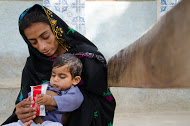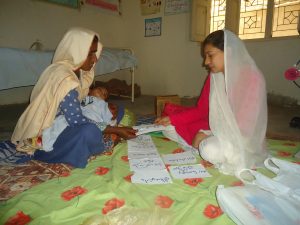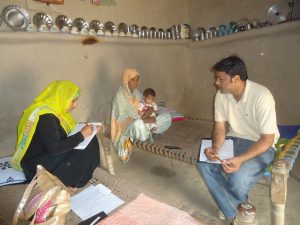Shaping the future: Our strategy for research and innovation in humanitarian response.

Shaping the future: Our strategy for research and innovation in humanitarian response.



This study involves collecting both quantitative and qualitative data to compare the effectiveness of three different water treatment methods in the context of a CMAM program that ACF operates in Dadu District of Sindh Province. We began data collection in February, and have been working through numerous challenges in the field through the energy of a skilled and motivated field team.
The process of the study involves enrolling study participants at CMAM sites as they come to enter their children in the CMAM program. The 20 study sites are split into the four arms of the study, with a different water treatment device allocated to each arm. One arm receives ceramic filters, another receives PUR sachets, a third receives Aquatabs, and the final arm serves as a control group. In all four groups, study participants receive hygiene promotion at the time of enrollment. The field team members enrolling the participants also give a full demonstration of the water treatment devices, ensuring that participants understand their use and/or maintenance. When participants return to the CMAM sites for their weekly monitoring visits, our field staff are also there to record the children’s progress toward recovery from SAM and to offer additional information on health and hygiene.
To complement this quantitative data, a small subset of participants also provides qualitative data. Some field team members visit these participants in their homes to take in-depth interviews, gathering rich information about participants’ understanding of child health, care-seeking behavior, and use of the water treatment devices distributed.
Though both the project and the environment are challenging, the field team has worked together to pursue creative solutions. Field staff enrolling participants at CMAM sites face difficulties in shortage of space, time pressure from participants who are coming for new enrollment or for follow-up visits, and a variable security situation that may cause sites to close on some days.
We have maintained close collaboration with the staff at these CMAM sites, so that the nurses enrolling children in the CMAM program understand the study aims and give vital support to the team in the field. Another challenge is that in the local context male field staff cannot always access female study participants in order to take surveys or interviews. Our female staff have been a great asset in this regard, particularly when the study requires visiting participants’ homes.

Enrollment in the study will be ongoing for another two months on a rolling basis, and we are excited about the continued opportunity to engage with challenges in the field.

 Please upgrade your browser
Please upgrade your browser
You are seeing this because you are using a browser that is not supported. The Elrha website is built using modern technology and standards. We recommend upgrading your browser with one of the following to properly view our website:
Windows MacPlease note that this is not an exhaustive list of browsers. We also do not intend to recommend a particular manufacturer's browser over another's; only to suggest upgrading to a browser version that is compliant with current standards to give you the best and most secure browsing experience.